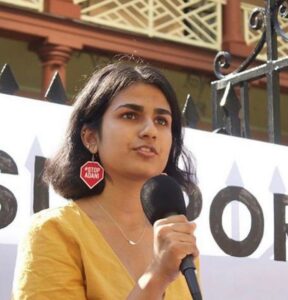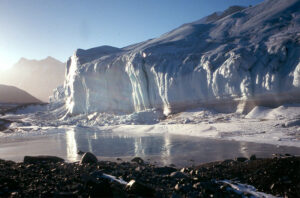COP26, the UN Climate Change Conference, is a moment when many people’s feelings about climate crisis are brought to the fore. Ways of expressing these emotions through language throws up numerous issues of interest to linguists, translators, interpreters, and communication scientists. Movement is central here. New words can go from specialist areas into wider public spheres. Existing meanings of emotion words shape new coinages. The status of English as a global language affects what gets discussed. There may be inter-influences between languages. Cultural and linguistic backgrounds, as well as diverse migrant experiences, can have a relationship with subjective feelings about climate change.

<https://search.creativecommons.org/photos/198016e5-603f-4a09-a224-3cae91a83b04>
[Notes: [Varsha Yajman is an Australian climate activist featured in the podcast referenced with the link <https://www.abc.net.au/radionational/programs/bigideas/overcoming-eco-anxiety/12008548>]
For around the last 40 years people have been talking, writing, and theorising about the bad feelings environmental destruction evokes. Some of these English words come from this work because, at around the same time, a number of people coined different words to describe what seemed like new phenomena. Some thinkers have made various systems of categorising these emotions, e.g. how eco-anxiety differs from climate anxiety; what is climate anxiety and what is climate grief.
Specialist words describing states of the psyche are picked up popularly when they resonate. Around the world, experts are measuring people’s distress levels about climate change. In Australia, the current National Climate Action survey conducted by Griffith University’s Climate Action Beacon is indicating that roughly between one third and one half of Australians feel some distress about the threat of climate change, and the young are more distressed than the old.
One never knows what is going to happen to a word when it moves. The meanings of words like eco-anxiety and climate grief aren’t necessarily fixed yet in ordinary English. This observation comes out of a study of a collection of English language podcasts recorded in Australia between 2019 and 2021 on the topic of climate emotions. For example, in 2019, the popular Australian media network MamaMia’s show The Quicky said ‘eco-anxiety, ecological grief, climate anxiety these are all newly coined phrases that describe the same thing’.
A lot of people who may have already felt distress about climate change were introduced to specific words like climate anxiety in the last few years. A number of earlier podcasts were essentially asking ‘what is this new thing climate anxiety?’, so people were discussing the language in the programs. Some commentators found having a word useful because it allowed them to talk more easily about what they were feeling and gave it a status as a ‘thing’. Others thought these kinds of words were unnecessary for what was an everyday worry or felt a word like climate anxiety implied that these understandable feelings were symptoms of a mental illness.


“Anxiety’ by Kevin Dooley is licensed under CC BY 2.0
<https://www.flickr.com/photos/pagedooley/31328618566>
“Melting Ice Caps” by Gerald Simmons is licensed under CC BY 2.0 https://search.creativecommons.org/photos/3768c4a1-b267-4504-a594-371d7f8834c0
It’s curious that the English emotion words based on anxiety and grief could be elided because, on their own, they have different meanings. The compounded, new coinages need to be understood on their own terms, but existing associations with anxiety and grief could be significant as to how they are received. When we look at a large, computerised database of naturally occurring English, we can see anxiety and grief behave differently.
Anxieties can be numerous: separation anxiety, health anxiety, social anxiety, parental anxiety, so climate anxiety could be one among many. Anxiety disorders are also mental illnesses, and although climate anxiety or eco-anxiety are not classified as disorders, the association could be there. Anxiety is about knowing something bad can happen to you and wanting to do something because of this.
Grief tends to be used in the singular, grief not griefs. While grief can combine with words like cancer and suicide, these only appear very rarely. To grieve is a verb, considered a process. As a psychiatric diagnosis ‘grief disorder’ is marginal. Grief is about the loss of someone or something that was like a part of you and wanting to think about this for some time.
In the podcast collection, the anxiety-expressions, such as eco-anxiety, seem to be more attributed to children, young people and activists. The notion of ‘wanting to do something’ fits well with the idea of a young climate warrior. Grief-expressions, such as climate grief, appear to be used about adults, in particular, scientists. It’s possible that grief is seen as a more prestigious and sophisticated word, and that adults are perceived as having an established relationship with all that is being lost to climate change.
It is unclear what will happen with these English words as the climate crisis continues. Possibly they will settle into more discrete categories in ordinary English. Maybe one will win out over the others, or we will talk about anxiety and grief.
The status of English as a global language means that a lot of discussion uses these English words. An English language podcast produced in Australia, being listened to around the world, may interview a German climate activist about her eco-anxiety. Yet the German Klimaangst may be different in nuance, and angst-expressions and anxiety-expressions may have influenced each other over the years.

Swedish climate activist Greta Thunberg, although only one of many young leaders around the world, can be considered an articulator of climate emotions in English despite it not being her first language (see the neologism ‘the Greta effect’). People from Nordic countries have had a great influence on global discussions of environment.
Environmental discourses coming out of the Global North, such as the podcast collection studied, do not necessarily touch on experiences in the Global South where climate change is affecting people most. New ways of talking that arise out of the varied emotion categories of different languages is a topic that I would like to learn more about.
The National Climate Action Survey is so far indicating that, in Australia, people who speak a language other than English at home experience more distress about climate change than those who speak English at home. The reasons for this need to be further investigated. They could be numerous, such as, lived experience of climate change, news from family overseas, exposure to more varied media sources, or the higher level of distress generally experienced by migrants in Australia.
Emotions about climate change may become discussed more frequently and in more contexts. And people don’t necessarily use convenient labels but can express them in numerous ways, including figurative language (it’s consuming me) or descriptions of bodily experience (I was choking back tears). Wicked problems require contributions from multiple disciplines. The complexities of negative feelings about climate change, including how best to deal with them, are being addressed in psychology, medicine, humanities, and social science. Linguists, translators, interpreters, and communication scientists are well placed to help deal with challenges of communicating feelings in climate crisis.
Helen Bromhead is a linguist who studies environmental discourse, semantics and pragmatics from a cultural perspective. She is a Postdoctoral Research Fellow in the Centre for Social and Cultural Research, Griffith University, and a project lead in the Griffith Climate Action Beacon.
Cover image “hobart-school-strike-4-climate-action_29-november-2018_44282459880_o” by #StopAdani is licensed under CC BY 2.0 <https://search.creativecommons.org/photos/c4afc9a4-5d53-4d5c-9395-dc9bd21fdb56>






